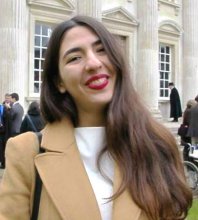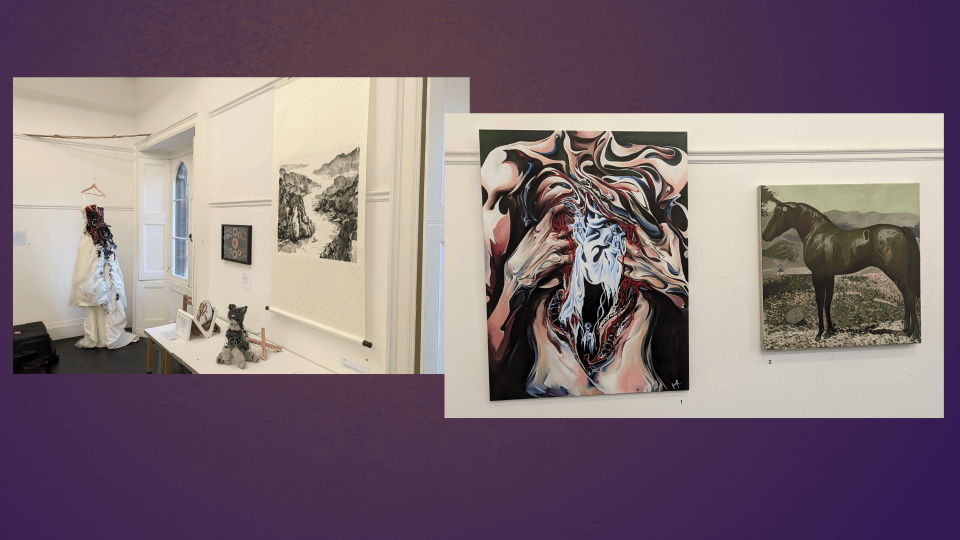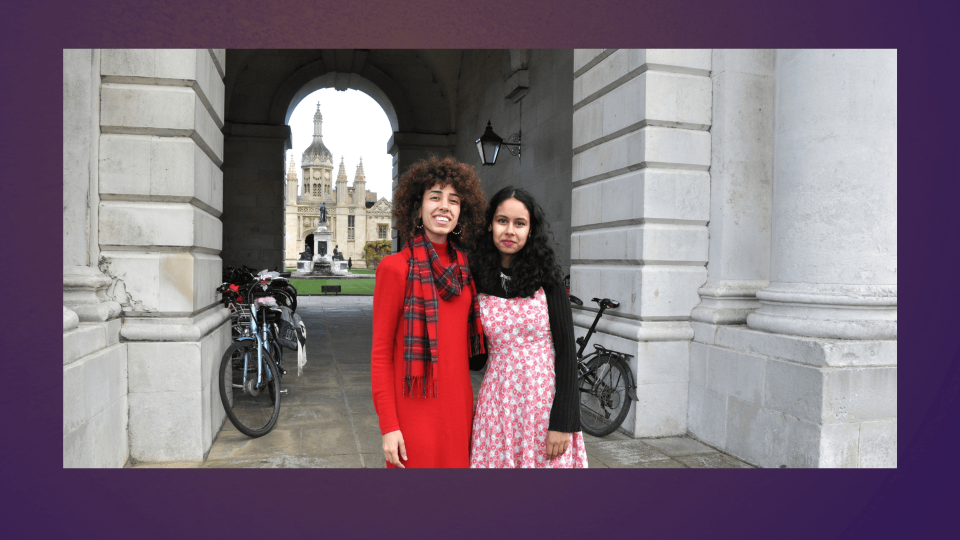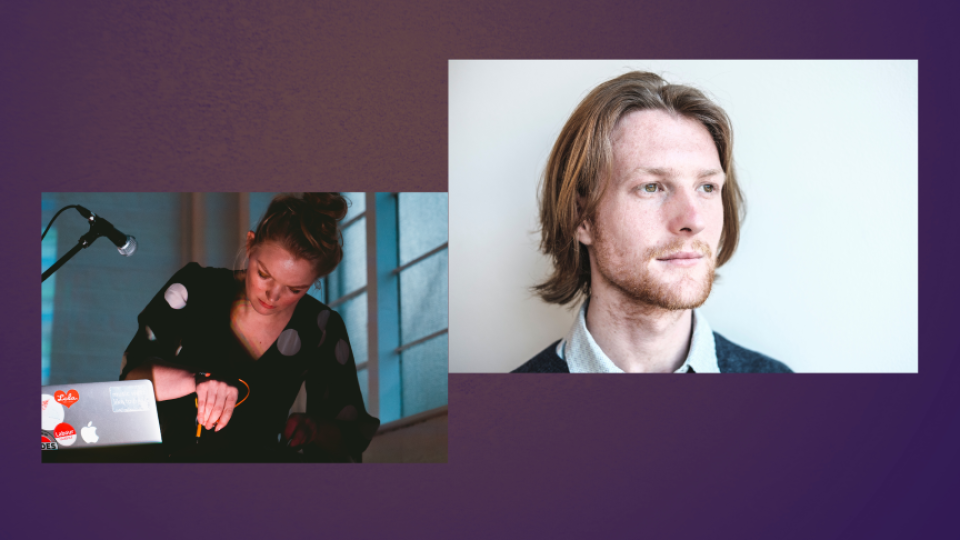
Eleni is from Nicosia in Cyprus and did A levels in English Literature, Mathematics, Modern Greek and Geography. She has just finished her third year here at King's College, Cambridge, and has graduated with a degree in Human, Social and Political Sciences (HSPS), specialising in Politics and International Relations.
From June 2016
Why did you want to do a degree in HSPS?
If, like me, you're interested in the humanities and social sciences but have fumbled around trying to find your passion, you'll gain a lot from studying HSPS. When I was doing my GCSEs (at an English School in Cyprus) I wanted to study English Literature; a couple of years later, I decided to study Geography and got accepted onto the course at Cambridge in 2013; but then, by the end of my first year at King’s, I’d switched to Human, Social and Political Sciences. In the past, people had always remarked on my engagement with politics and I was involved in debating and Model United Nations at school, but it was after arriving at King’s that the people I met and the activities I became involved in really helped my interest to take off.
What attracted you to King's?
Reading about the long and colourful history of political activity at King’s was a major factor that influenced my decision to apply here. I was particularly attracted by the prospect of an active and vibrant college community. I remember reading an ‘Alternative Prospectus’ published by the Cambridge University Students’ Union (CUSU) which described King’s as marrying pomp and splendour – in its world-famous Chapel and choir, spectacular dining hall, and sprawling gardens – with a restless revolutionary spirit.
But having experienced King’s, I know that both these elements can be easily overstated. I certainly found what I wanted at King’s, but I’d say that its ‘revolutionary’ aspect is not that its students are all radical and politically subversive, but that it succeeds in fostering a close, tight-knit community made up of a hugely diverse and varied mix of people. And it’s amazing how, though King’s is blessed with beautiful architecture and a grand history, its character is neither pompous nor splendid – rather it succeeds in offering a warm, inclusive and welcoming space for all of us who 'go here’.
Did you find it easy to settle in at King's?
From day one I really did feel at home here and like I was becoming part of a community at the college. The first people I met were my ‘college parents’ – King’s students in the year above who were there to show me around and offer advice and support. My college parents, Kelly and Tomo, had sent me a lovely letter over the summer introducing themselves and congratulating me on my meeting my offer, and when I arrived they really helped me feel like I was part of a family at King’s. In fact, college ‘families’ start a bond that can last throughout your time at Cambridge – just a few days ago Kelly and Tomo returned to King’s to attend a graduate formal, and we took a final family photo a week before my own graduation! And my college husband, George, whom I ‘married’ on Bonfire Night in 2013, just got back from his year abroad and came back to Cambridge to see all of us again – it was like nothing had changed!
Lots of the Freshers’ Week activity, including the college parent system, is organised by the King’s College Student Union (KCSU), which spends several months planning how to give new students the warmest welcome possible. One of my most vivid memories from Freshers’ Week is my first KCSU Open Meeting in the student bar – it was a taster of the many subsequent meetings I would (religiously) attend over the course of three years, where King’s students have frequently had heated and often entertaining discussions about food and drink prices, rents, the National Union of Students, and the living wage. Every three or four years there’s even a debate about whether to keep the soviet flag in the bar – which has survived thus far! This type of energy and political discussion was what I hoped to find at King’s when I applied, and KCSU has never let me down.
What was the transition from A level studies to Cambridge like?
Looking back, transitioning from writing A level scripts to producing undergraduate-level essays within the space of a few months is definitely the biggest academic jump you’ll ever make. That may sound scary, but at King’s you get help every step of the way: first from your college parents and then from your supervisors. The essays you write for HSPS during the year don’t count at all towards your final grade, and so you have plenty of time to get into the swing of things. Because of that, going from A level to Cambridge is actually less of a ‘jump’ and more of a steady bike ride up a slope – you’ll find that each essay you produce gets better and better, and when you compare the material you’ve written at the end of your first year at King’s to the stuff you used to write at school, you’ll marvel at how far you’ve come without even realising it!
If you could recommend two good books for students interested in HSPS, what would they be?
You shouldn’t feel pressured to tackle any dense, heavy volumes marketed as ‘required reading’ for Cambridge politics students or the like. There is no required reading for prospective students. HSPS is an extremely broad course, and as such it allows you to focus on the areas of social science that interest you – so you could look at what books have recently topped the non-fiction charts in the subjects you’d like to take in the first year of your degree.
Aside from looking at any Department-recommended reading lists, try and get to grips with the themes and concepts you’re genuinely interested in – whether they’re related to the history of democracy or the structure of the European Union – and develop your understanding of them so that you can express your opinions in a clear and powerful way. Several people from the Cambridge Department of Politics and International Studies (POLIS) have recently published books aimed at popular audiences; so if it’s the history of democracy you’re interested in you could look up David Runciman’s "Confidence Trap", or if EU institutions make your heart race then see what you make of Christopher Bickerton’s "The European Union: A Citizen’s Guide". Note that – to emphasise again that nothing is absolutely required – I haven’t read either of these yet!
Are the course and teaching what you thought they would be?
I’m emphasising the breadth of the course and the lack of ‘required reading’ because, no matter how often I heard it, I never fully realised how self-directed university study really was. It’s fundamentally about pursuing your own interests in an expertly structured and guided way – so by choosing the subjects and papers that most appeal to you, you allow yourself to be led into a rigorous study of politics, or sociology, or anthropology, or whatever else, by world-leading academics in the field. The aim is that, by the time you finish, you have acquired the capacity to think critically and question what those world-leading experts are saying.
I don’t remember at all now whether this was what I was expecting, as so much has changed in the past three years. Ultimately, there was no big revelation or life-changing moment during my time here when I finally realised what it was all about – in practice the nature of the course itself was pretty much as described on the King’s and Cambridge websites, with teaching structured around lectures and ‘supervisions’ on the topics I chose to study. There is no way to know what the process of learning will be like for you – what you’ll find difficult and how you’ll overcome it – until you get here, and that’s part of the experience! There is no ‘right’ or ‘normal’ way to experience Cambridge.
How do supervisions work?
People always go on about Cambridge supervisions and how special they are, but I didn’t know what that meant until I got here. The core idea is that you participate in an hour-long discussion with one or two other students led by an academic (or ‘fellow’), related to a piece of work (normally an essay) that you’ve each submitted beforehand. As it turns out, though, supervisions can be conducted in a variety of different ways – some fellows get you to summarise the argument of your essay at the start and discuss it with the rest of the group; others will try and counter your arguments to get you to defend or revise your claims; and others will spend most of the time talking you through the material and developing new facets of the topic.
As a result supervisions can vary, and you can find yourself talking quite a lot during some and much less in others. One thing all supervisions have in common is that they are simultaneously challenging and extremely rewarding – I can’t tell you how many times I’ve left the room feeling that I’ve understood something important much more than before I went in.
What kind of things do you discuss in supervisions?
You end up discussing a huge range of things at supervisions over the course of your degree, because you get to study and write on such a broad set of topics. Thinking back to second year, which was the year I covered the most breadth in terms of the course, things we discussed in supervisions included: whether human rights are ‘natural’ birthrights or ‘political’ constructed ideas; the ethics of drone warfare; how Jean-Jacques Rousseau intended his theory of the ‘social contract’ to be enacted in practice; the role of war in the emergence of the modern state; whether Edmund Burke can be described as ‘conservative’; the apparent decline of political parties; what ideals like ‘democracy’ and ‘sovereignty’ meant for those involved in the French Revolution; and the extent to which the mass public can influence US foreign policy. I also took a second-year paper in Statistics & Methods, and in those supervisions we discussed how to interpret data from published journal articles and used online statistical software to further analyse them.
Where do you usually work?
I’m one of those people who likes to have a fairly regular workspace, so I’ve done most of my work this year in King’s library. I even had a regular seat! In the past I’ve also spent a lot of time working in King’s coffee shop, which offers a more relaxed environment with plenty of opportunities for breaks, biscuits, and conversations with other students and staff. I’ve written some of my best essays in there to the muted sound of Taylor Swift songs emanating from the speakers. But if you’re less ‘locationally-tied’ than I am, there are many libraries and cafes across Cambridge that make really good workspaces, depending on what you’re after – from the grand and well-stocked University Library to the scenic Grad Café at the top of the University Centre.
What are the facilities like for HSPS?
Pretty much the only facility you need for HSPS – or at least the Politics track – is easy access to books and articles. King’s is excellent in that respect. You tend to be able to borrow almost all the books you need for HSPS from King’s library, and you don’t have to return them until the end of term (if you like, you can even renew loans and keep books over the vacations).
If King’s doesn’t have a book you need, you can fill in an online form to request it so that the King’s library staff place an order and send you a notice when it arrives. Alternatively, you can pay a visit to the University Library or the Social and Political Sciences (SPS) Library, both of which are a five-minute walk from the college, and find the book there. This is rarely necessary because so many of the resources you’ll be after are online – I’ve downloaded countless lecture slides as well e-books and pdfs of journal articles. The SPS Library staff even scan and upload key chapters from the core books for each paper onto an online platform accessible by all HSPS students, so that none of us are in a position where we can’t access important material that we need for our next essay.
Did you specialise at all in third year?
Around 75% of my third-year studies were on the history of political thought, particularly in 18th-century Scotland (which was the focus of my dissertation) and 20th-century Germany (one of my papers being on European political philosophy from 1890 onwards). This may not sound immediately appealing – in fact the history of political thought is a discipline I never knew existed until I began my first year of HSPS. But by the time I graduated this year it had become one of my biggest interests.
In that sense I didn’t realise, at the time when I began my degree at King’s, what an exciting time it would be – one of the ways in which university changes you is that it opens new doors into areas of study which you will absolutely love but don’t know it yet.
Which papers did you take?
In third year, I took four papers. My favourite was ‘The History of Political Thought since 1890 and Political Philosophy’ – we studied thinkers like Friedrich Nietzsche, Carl Schmitt and Max Weber and how their ideas developed in response to the political events of the tumultuous twentieth century, and explored recent debates in political philosophy over things like concepts of liberty and the nexus between politics and morality.
Another paper I took was ‘Conflict and Peacebuilding’, in which we studied theories of why and where conflict occurs, plus different approaches to alleviating that conflict and restoring peace. We looked at several case studies, including Yemen and the Great Lakes region in Africa, learning how well the theory translates into practice.
A third paper was ‘Conceptual Issues in Politics’, a very broad paper in which we had the opportunity to select big questions in politics – such as what makes a good politician, whether there are alternatives to democracy, or whether politics can be moral – and answer them using the material we’d specialised in, which in my case was political thought.
Finally, I decided to write a dissertation of my own choosing (instead of taking a fourth exam paper). My dissertation was on ‘Society, government, and political obligation: The role of war in the political thought of David Hume and Adam Ferguson’. Again, this is a dissertation topic that would have meant nothing to me two years ago – but I ended up winning a prize for it!
What do you like to do when you're not working?
I’ve written so much about my degree that it may seem that it entirely defined my experience at King’s – but, though I enjoyed studying HSPS immensely, this really wasn’t the case! I actually found that committing myself to lots of other things, like organising campaigns, writing articles or helping run societies, were my most rewarding and formative experiences while at the college. I spent a lot of time canvassing and campaigning in the run-up to the General Election, wrote a handful of articles during my time here for both student papers and national publications, and helped out with King's College Student Union (KCSU) initiatives like the Living Wage Campaign in my first year.
I spent perhaps the biggest chunk of time on King’s Politics, a society I co-founded in my second year with a group of friends at King’s. With support from college and KCSU funding, we at King’s Politics organised three panel debates per term featuring high-profile speakers from across Britain – the topics of discussion ranged from the ethics of military intervention to the importance of positive discrimination. We occasionally hosted individual speakers, like Anthony Giddens on the sociopolitical effects of technology and Neal Ascherson on nationalism in Europe. The society has grown lots and it’s really exciting to watch how it’s carrying on after those of us who started it have left!
Of course my free time wasn’t all dedicated to societies and campaigns: I’ve enjoyed spending many an evening in King’s bar after dinner, and going to a pub or club around once a week – though probably my favourite types of night out were in King’s Bunker, a famed underground cellar in the college where King’s students host fortnightly club events. I also went to a handful of ‘formal halls’ per term, seizing the opportunity to dress up and enjoy a fancy dinner before dancing to live music or a set by King’s very own ‘DJ Am’ in the bar. Even if you decide not to go to formal hall (or if you don’t get a ticket!), you’ll almost undoubtedly join the fun in the bar afterwards. King’s really does throw the best parties – we have a reputation for it! – and I’ve had some of the best times of my life at end-of-term events known as King’s Mingles, at the annual post-exam ice-cream-and-bouncy-castle ‘Fun Day’, and the huge end-of-year fancy dress party, the King’s Affair.
How did you get involved with King College Student Union (KCSU) and how have you found it?
The biggest and most important commitment I made while at King’s was becoming KCSU President in my third year. It was also by far the most rewarding thing I’ve done. My most important job as President was to attend fortnightly College Council meetings, where all of King’s policy decisions are taken. There’s a lot at stake in these hour-long negotiations – things like whether King’s will fly the LGBT flag on February 1st and how to best provide financial support to all students who need it. As a student rep on Council you can’t miss a beat – you are there to represent the entire undergraduate body at King’s, and your action or inaction will affect the lives of current and future generations of students. Nevertheless, having the wholehearted support of the King’s student body made this responsibility a whole lot easier to manage – and to this day I am always amazed by the level of participation in Open Meetings and campaigns, and how keen King’s students are to express their views and help in practical ways.
I was elected President at the end of my second year and stayed in the position until I graduated. It was actually the second time I’d stood for election to the KCSU Exec, having unsuccessfully tried to become KCSU Vice President (External) in my first year. For that reason I always encourage new students to go for it – don’t be afraid of losing your first election, you can always try again and prove your commitment to serving the students of King’s!
Do you know what your plans are for the future?
Having just graduated (and returned from Glastonbury!), I’m spending the summer interning for a Cambridge-based startup, Africa’s Voices. After that I’m hoping to find work as a journalist in London – I love both writing and politics and hope to combine the two, perhaps through a career in political journalism, policy research, or speechwriting.
What support is there for people finishing an HSPS degree and wanting to either go into postgraduate study or a job?
There’re no doubt that you make some great friends and contacts at King’s, plus the college and the university have some fantastic facilities to help you figure out what to do after you’ve graduated. The University Careers Service has a huge quantity of resources that guide you through the next steps after finishing your degree so that you can pursue the career you want – they give you invaluable advice on how to get into any industry, as well as how to write a CV and do well in interviews and job assessments.
People with HSPS degrees go on to a whole set of different types of jobs or postgraduate degrees. Many, like me, are interested in working in government or the media; some HSPS graduates I know have joined the Civil Service, and many of my friends doing politics have entered graduate schemes in consultancy, marketing and teaching. Though I don’t have any concrete plans after October I don’t feel worried, because I know that the skills I’ve developed and experiences I’ve gained while studying at King’s have prepared me for whatever comes my way.


